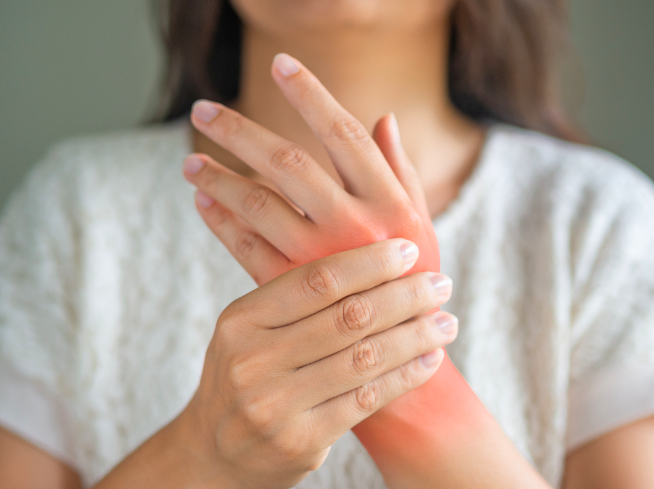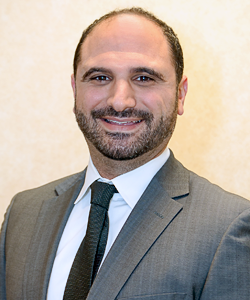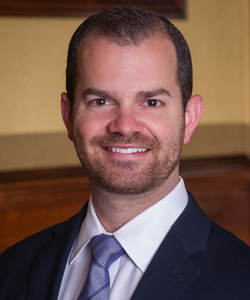Rheumatoid Arthritis: Symptoms, Causes & Treatment Options

Achy and painful joints are unfortunately a common experience in many adults’ lives. These aches and pains are often the work of arthritis, a condition characterized by inflammation of the joints. Every joint in the body has cartilage and synovium (a soft tissue envelope that encases joints and releases fluid) that cushions the joints and allows for smooth movement. Arthritis in its various forms, is the breakdown of this vital cartilage and synovium. When cartilage and synovium are damaged or diminished, the bones of the joints grind together. This grinding results in pain, stiffness, swelling, and immobility. According to the CDC an estimated 54.4 million US adults (22.7%) have been diagnosed with some form of arthritis. Of that 54.4 million, approximately 1.3 million suffer from rheumatoid arthritis.
What is rheumatoid arthritis? Rheumatoid arthritis is actually an autoimmune disease. An autoimmune disease is a chronic condition which causes your immune system, the body's defense against infectious organisms and other invaders, to mistakenly attack the body itself. In the case of rheumatoid arthritis, also known as RA, the immune system begins attacking the cartilage and synovium of the joints resulting in inflammation and joint breakdown.
Symptoms of RA may present very similarly to other forms of arthritis, often leading to an incorrect initial diagnosis. Symptoms include:
- Joint pain
- Joint swelling
- Joint stiffness
- Numb hands or feet
- Eye issues
Other less common symptoms may include:
- Fatigue
- Loss of appetite
- Low-grade fever
- A general, full body feeling of sickness
RA is a long term, chronic disease. Symptoms typically present in periods known as flares. If left untreated, joint erosion can lead to permanent damage and disability. Patients suffering from RA are also at a higher risk of heart disease.
Diagnosis can take time and may require lab testing in addition to examination. Tests may include X-Rays or MRIs to check for damage in the joints, and blood tests measuring the presence of immune response antibodies in the blood.
RA is most common in patients aged 30 - 50 years, and disproportionately affects women. According to the American College of Rheumatology, a whopping 75% of RA sufferers are women. Unfortunately, the root cause of the disease remains unclear.
Common Rheumatoid Arthritis Myths
Myth #1: Rheumatoid arthritis is caused by genetics.
While there is a correlation between a genetic predisposition to RA and environmental factors that leave some with a higher predisposition, the root cause of RA remains unclear. Factors such as age, sex, and lifestyle habits like smoking and poor dental hygiene may increase the odds of predisposition but none of these factors are believed to be the direct cause of disease.

Myth #2: Rheumatoid arthritis can be cured
Unfortunately like most autoimmune diseases, RA is a chronic condition with no known cure. However, RA is treatable and remission is possible. Signs of remission include decreased pain, fewer affected joints, and low levels of blood proteins that indicate inflammation.
Treatment
When dealing with RA, early diagnosis and treatment is key to prevent permanent damage. The most common treatments for RA include:
- Lifestyle changes: Ensuring the patient is getting enough sleep, following a healthy diet, and managing stress levels can reduce the severity of flare ups.
- Corticosteroid injections: After quality lifestyle changes, RA specialists will typically continue managing symptoms with the help of inflammation reducing corticosteroid injections.
- Disease-modifying antirheumatic drugs (DMARDS): RA is managed primarily through the use of DMARDS which slow the progression of the disease, preventing more serious symptoms and complications. DMARDS work by suppressing the body’s immune and inflammatory responses.
Surgery
Due to the autoimmune nature of the disease, the primary path of treatment for RA is through non-surgical means. However, severe joint damage may require surgical intervention to prevent further damage, reduce pain, and improve the quality of life. Surgical treatment options for joint damage caused by RA may include:
-
Joint Repair: A minimally invasive surgery that smoothes and realigns the joints in cases where the cartilage has been severely depleted.
-
Joint Fusion: Most commonly used in small joints such as in the feet or hands. In this procedure the ends of bones are removed and realigned so that the new bones can knit together. In cases of severe joint damage, a total joint replacement (where the joint is replaced with artificial parts) may be necessary. This is most common in weight bearing joints such as the knees and hips.
Rheumatoid arthritis can run the gamut between mild to debilitating, and every case is different. Your doctor will work with you to find the treatment that best fits your case and lifestyle.
Next Steps at MidAmerica Orthopaedics
Open communication with your joint specialist is key when managing RA. At MidAmerica’s Total Joint Clinic, our team of industry experts will be with you on every step of your diagnostic, treatment, and remission journey.

Amongst the arthritis specialists on the MidAmerica Total Joint Clinic team are Dr. Bedikian and Dr. Meisel.
Dr. Bedikian’s specialties include reconstruction, knee, and hip issues, and he strives to return patients to active, healthy lifestyles through a collaborative approach to treatment.

Dr. Meisel is a sports medicine and arthroscopy specialist who aims to improve the quality of life for his patients through the use of cutting edge, surgical and non-surgical treatment.
To learn more about MidAmerica Orthopaedics and the different treatment options available to you, request an appointment online or call (708) 237-7200. MidAmerica Orthopaedics serves various areas such as Chicago, Tinley Park, Palos Hills, Mokena, Evergreen Park, New Lenox, Oak Lawn, Orland Park, and more.

